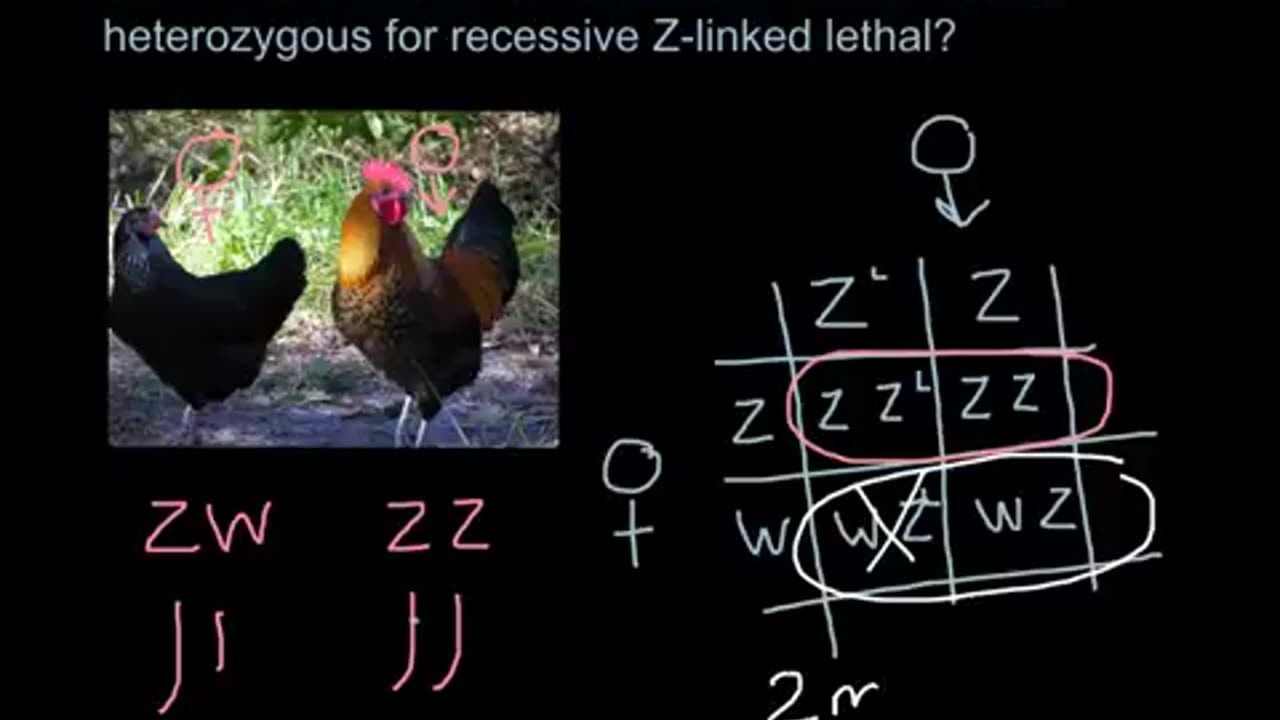Premium Only Content

X-linked lethal gene cross
Recessive Lethal Genes
In 1907, Edwin Baur began his work with the snapdragon plant Antirrhinum and characterized the condition aurea, in which plants had golden instead of green leaves (Baur, 1907; Castle & Little, 1910). When two aurea snapdragon plants were crossed, Baur observed a 2:1 ratio of green seedlings to yellow seedlings. Homozygous aurea plants lacked normal chlorophyll development and died either during the embryonic stage or when the plant seedlings were two to three days old. In other words, like Cuénot's homozygous mice, the homozygous aurea plants could not fully develop, so an entire class of progeny died (Castle & Little, 1910).
Cuénot and Baur discovered these first recessive lethal genes because they altered Mendelian inheritance ratios. Recessive lethal genes can code for either dominant or recessive traits, but they do not actually cause death unless an organism carries two copies of the lethal allele. Examples of human diseases caused by recessive lethal alleles include cystic fibrosis, sickle-cell anemia, and achondroplasia. Achondroplasia is an autosomal dominant bone disorder that causes dwarfism. While the inheritance of one achondroplasia allele can cause the disease, the inheritance of two recessive lethal alleles is fatal.
Dominant Lethal Genes
Dominant lethal genes are expressed in both homozygotes and heterozygotes. But how can alleles like this be passed from one generation to the next if they cause death? Dominant lethal genes are rarely detected due to their rapid elimination from populations. One example of a disease caused by a dominant lethal allele is Huntington's disease, a neurological disorder in humans, which reduces life expectancy. Because the onset of Huntington's disease is slow, individuals carrying the allele can pass it on to their offspring. This allows the allele to be maintained in the population. Dominant traits can also be maintained in the population through recurrent mutations or if the penetrance of the gene is less than 100%
-
![🔴[LIVE] Breaking Market News, Stocks Pump & Live Trading $1M || The MK Show](https://1a-1791.com/video/fww1/a7/s8/1/D/2/H/G/D2HGy.0kob-small-The-MK-Show-May.-1st.jpg) LIVE
LIVE
Matt Kohrs
10 hours ago🔴[LIVE] Breaking Market News, Stocks Pump & Live Trading $1M || The MK Show
1,960 watching -
 LIVE
LIVE
Wendy Bell Radio
6 hours agoTaking Care Of Business
8,533 watching -
 LIVE
LIVE
Discover Crypto
1 hour agoEMERGENCY BITCOIN ALERT! Fed Rate Cut = MASSIVE PRICE SURGE AHEAD!
122 watching -
 1:01:04
1:01:04
2 MIKES LIVE
2 hours agoTHE MIKE SCHWARTZ SHOW with DR. MICHAEL J SCHWARTZ 05-01-2025
20.1K1 -
 DVR
DVR
NEWSMAX
2 hours agoThe Gerry Callahan Show LIVE (05/01/2025) | NEWSMAX Podcasts
1.39K -
 21:35
21:35
Anthony Pompliano
18 hours ago $0.06 earnedCIA Says Bitcoin Is A Tool They Use
6.88K3 -
 1:10:43
1:10:43
Dear America
14 hours agoTrump Cabinet Meeting: We voted for this + U.S.-Ukraine Minerals Deal Sealed
51.8K4 -
 20:36
20:36
Stephen Gardner
15 hours ago🔥RFK Jr. makes SHOCKING ANNOUNCEMENT!
15.1K57 -
 41:12
41:12
The White House
3 hours agoPress Secretary Karoline Leavitt and Stephen Miller Brief Members of the Media, May 01, 2025
35.3K41 -
 59:38
59:38
BEK TV
9 hours agoMedical Mysteries Revealed. What Mel Gibson and Joe Rogan were Afraid to Say Out Loud
4.99K